| Welcome |
| Miyôskamin! It is spring and so begins the melting months when snow buntings and geese push their way northward and sunlight fills more and more hours of our days. On behalf of the NCCAH, I warmly welcome you to our Spring Newsletter in which you will find information on our recent, ongoing and future activities and knowledge resources. During the month of January, Donna Atkinson, Manager of the NCCAH, shared our work on the social determinants of Indigenous peoples' health at the Canadian Partnership against Cancer's First Nations, Inuit and Métis Cancer Control Forum: Celebrating Partnerships and Progress (Calgary, January 25-26, 2017). That same week, I participated at the 8th Annual Child Right Academic Conference hosted by the Landon Pearson Resource Centre for the Study of Childhood and Children's Rights (Ottawa, January 27, 2017). Shortly thereafter, the NCCAH organized and hosted a two-day workshop entitled Sexually Transmitted and Blood Borne Infections (STBBI) National Indigenous and Stakeholder Meeting (February 1-2, 2017). This gathering of national Indigenous organizations and community representatives working in the area of STBBIs aimed to identify Indigenous-specific actions for presentation at the National Stakeholder Meeting to Identify and Prioritize Concrete Actions to Address STBBIs in Canada (February 23-24, 2017). Both of these meetings were held in Ottawa. As part of our work on Indigenous child, youth and family health, I presented at a number of events over February to May, 2017. These included the Public Health Agency of Canada's Aboriginal Head Start in Urban and Northern Communities (AHSUNC) Collaborative Intervention Research Forum (Ottawa, February 15, 2017), the Assembly of First Nations' First Nation Directors of Education National Forum (K-12 and Post-Secondary Education) (Calgary, February 28-March 2, 2017), the International Meeting on Indigenous Child Health (IMICH), co-hosted by the Canadian Paediatric Society and the American Academy of Pediatrics (Denver, March 31 - April 2, 2017), and the 2017 World Forum on Early Care and Education (New Zealand, May 9-12, 2017). On the horizon are several other national and international meetings at which we will present our work and share our knowledge resources. These include the Public Health 2017 (Halifax, June 6-8, 2017), the 12th National Community Health Nurses of Canada's Conference (CHNC) (Niagara Falls, June 20-22, 2017), and the World Indigenous Peoples Conference on Education (WIPCE) (Toronto, July 24 -28, 2017). We are pleased to have released a number of knowledge resources over the past several months. Of note, you will now find a series of video interviews with contributors to Beyond the Social: Social Determinants of Indigenous Peoples' Health, as well as a panel presentation that was recorded at the December 2015 NCCAH gathering, Transforming our Realities: The Determinants of Health and Indigenous Peoples, on our Vimeo channel. Other NCCAH resources to look for include the updated fact sheet on housing as part of the social determinants of health series, and four recently adapted child health and wellness booklets for First Nations and Metis parents in Manitoba. The NCCAH continues to host webinars on Indigenous peoples' health including exploring emerging priorities with "Two Spirit! Let's Hear It! - An Introduction to Two-Spirit Health" (April 12, 2017) and setting the context with "What's new is really old: Trauma informed health practices through an understanding of historic trauma" (April 21, 2017). If you are interested in knowing about all of our publications, please see the Resources Booklet: Spring/Summer 2017. Be sure to visit our website or subscribe to our mailing list to receive notifications of newly released NCCAH resources, upcoming webinars and our regular quarterly newsletters. Please enjoy and share our knowledge resources with your community and networks and join us on Twitter, Facebook, Google+, LinkedIn, Vimeo, YouTube, or SoundCloud to participate in updates as they happen! Meegwetch Margo Greenwood, Academic Leader
National Collaborating Centre for Aboriginal Health (NCCAH) |
|
| Attended Events |
Upcoming Events |
| The Ontario Public Health Conference (TOPHC) Toronto, Ontario, March 29 - 31, 2017. Conference web site link
International Meeting on Indigenous Child Health (IMICH) Denver, Colorado, March 31 - April 2, 2017. Conference web site link
Canadian Conference on Medical Education (CCME) Winnipeg, Manitoba, April 29 - May 2, 2017. Conference web site link
Lighting the Fire Conference Winnipeg, Manitoba, May 10 - 12, 2017. Conference web site link
2017 World Forum on Early Care and Education Auckland, New Zealand, May 9-12, 2017. Conference web site link
Please visit the online NCCAH calendar of events, which highlights conferences, workshops, and other events of interest in the field of Aboriginal Health including regional, national and global listings. |
Public Health 2017 Halifax, Nova Scotia, June 6-8, 2017. Conference web site link
12th National Community Health Nurses of Canada's Conference (CHNC) Niagara Falls, Ontario, June 20-22, 2017. Conference web site link
World Indigenous Peoples Conference on Education (WIPCE) Toronto, Ontario, July 24 -28, 2017. Conference web site link
Send us an email to [email protected] with "Calendar Submission" in the subject line if you have an event you would like added to our calendar. |
|
| New NCCAH Resources |
Beyond the Social: Author Interviews Complete series now online All of the contributors interviewed in this video series, from the highly-acclaimed book Determinants of Indigenous Peoples' Health in Canada: Beyond the Social, share a common concern with improving the health of Indigenous peoples in Canada and beyond. In sharing First Nations, Métis, and Inuit traditional knowledge alongside Western academic and medical knowledge, the authors demonstrate the potential gains of walking in two worlds, integrating the best of both Indigenous and Western knowledge, and honouring and respecting the diverse healing and medical practices available to us today. Read the web story | Watch all 11 videos | Listen on SoundCloud |
|
| For First Nation, Inuit and Métis peoples in Canada, who experience a disproportionate burden of illness, poverty is both deep and widespread. This paper briefly examines the breadth and depth of poverty in Indigenous communities using standard economic indicators. The paper shows some of the ways in which poverty contributes to lack of community health and well-being. It concludes by identifying a number of different strategies for tackling poverty in its economic dimensions, including some that have worked well in Indigenous communities. Read the fact sheet |
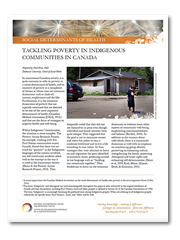
Tackling Poverty in Indigenous Communities in Canada
by Fred Wien |
|
| Dr. Brenda Macdougall's report weaves together a timeline of Metis in Canada, highlighting how kinship, culture, sovereignty and governance are critical to Metis identity and to their health and well-being. Read the web story |
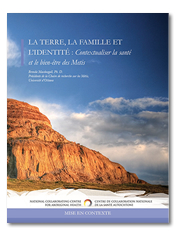
Land, Family and Identity: Contextualizing Metis health
and well-being
by Brenda Macdougall |
|
| The six NCCs for Public Health collaborated on a project focused on population mental health promotion for children and youth. The NCCAH paper aims to improve understandings of Indigenous mental health in Canada, and demonstrate how particular determinants either contribute to increased risk for mental illness or act as protective factors for positive mental health. Read the web story | Download the collection |
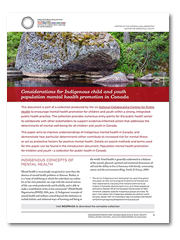
Considerations for Indigenous child and youth population mental health promotion in Canada |
|
| This fact sheet provides a review of the living and housing conditions of Indigenous households in Canada. The fact sheet begins by presenting demographic data, housing statistics and the rates of homelessness, followed by samples of innovative community-based housing initiatives, developments and options that are underway in Canada to improve the living conditions of Indigenous peoples. It concludes with the acknowledgement that investments in sustainable housing and related infrastructure are essential to addressing housing issues and ultimately reducing Indigenous health disparities. 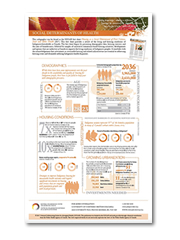
View the infographic
|
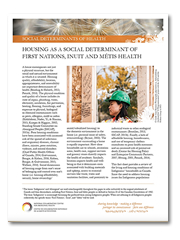
Housing as a Social Determinant of First Nations, Inuit and Métis Health |
|
| This resource booklet provides an overview of the activities, mandate and publications of the National Collaborating Centre for Aboriginal Health (NCCAH). It has been designed as a quick glance at over 170 knowledge resources, including fact sheets, reports, DVDs, reviews, and social media links, available on the NCCAH web site within the four main areas of our work. Request NCCAH publications |
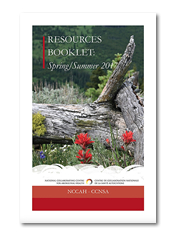
Resources Booklet:
Spring/Summer 2017 |
|
| To be released in 2017 |
NCCAH Webinar Resources
- "Two Spirit! Let's Hear It! - An Introduction to Two-Spirit Health"
(e-Alert will be sent in June)
- "What's new is really old: Trauma informed health practices through an understanding of historic trauma"
(e-Alert will be sent in June)
NCCAH Fact Sheets
- Education as a social determinant of First Nations, Inuit and Métis health (with an infographics page)
- Employment as a social determinant of First Nations, Inuit and Métis health (with an infographics page)
- Reconciliation in First Nations child welfare
- Indigenous Children and the Child Welfare System in Canada
|
NCCAH Reports
- Indigenous Communities and Family Violence: Changing the conversation by Cindy Holmes, PhD and Sarah Hunt, PhD
- The Built Environment: Understanding how physical environments influence the health and well being of First Nations peoples living on-reserve by Roberta Stout
- Menopause and Indigenous women in Canada: The State of Current Research by Regine Halseth, Dr. Charlotte Reading, & Nicole Robinson
Multimedia
- "Voices from the Field" podcast series
- "Heart Health" digital stories series
- New interactive timelines
|
|
| Request NCCAH Knowledge Resources |
| Did you know you can request our publications free of charge? Send your requests to [email protected] with "Publication Request" in the subject line, which publications you would like, a note about how you will utilize the resources, how many copies you'd like, your name and mailing address. We will do our best to accommodate your requests based on our current available printed inventory. Do you have a particular NCCAH publication that you or your organization found to be an excellent resource? If so let us know what it was by emailing us at [email protected] with "Publication Testimonial" in the subject line. We welcome your feedback. All NCCAH materials can be reproduced in whole or in part with appropriate attribution and citation. These materials are to be used solely for non-commercial purposes. To measure the impact of these materials, please inform us of their use by sending an email to [email protected] with "Publication Citation" in the subject line. |
|
| Online Resources |
| In support of creating a health community focused on knowledge synthesis, transfer and exchange we have chosen a sampling of current online resources to share. Please note the links provided in the NCCAH newsletters are for general interest only and do not indicate an endorsement. The views expressed in the linked resources do not necessarily represent the views of the NCCAH or our funder the Public Health Agency of Canada. Send us an email to [email protected] with "Online Resource" in the subject line if you have an online resource you would like added to our next newsletter. |
|
| 
Legal Services Society, BC & Healthy Aboriginal Network - "Emily's Choice" |
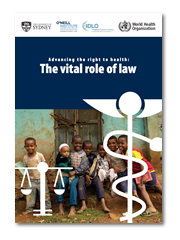
World Health Organization (WHO) - Advancing the right to health: The vital role of law |
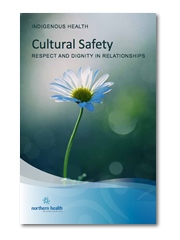
Northern Health: Indigenous Health - Cultural Safety: Respect and Dignity in Relationships |
| 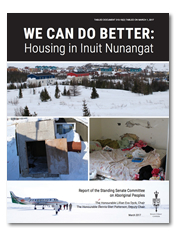
Senate committee report on housing in Inuit Nunangat |
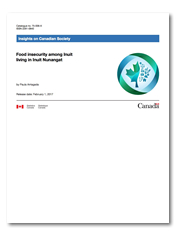
Statistics Canada - Food insecurity among Inuit living in Inuit Nunangat |
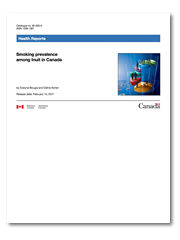
Statistics Canada - Smoking prevalence among Inuit in Canada |
| 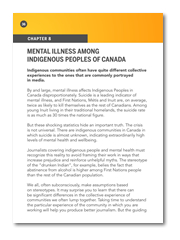
Mind Set Chapter 8 - Mental Illness Among Indigenous Peoples Of Canada |
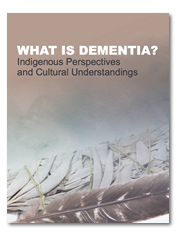
Indigenous Cognition & Aging Awareness Research Exchange (I-CAARE) - Dementia Fact Sheets |
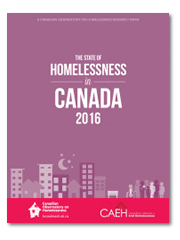
The State of Homelessness in Canada 2016 (with infographics) |
| 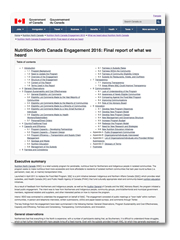
Government of Canada - Nutrition North Canada Engagement 2016: Final report of what we heard |
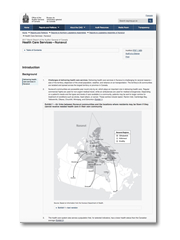
Report of the Auditor General of Canada - Health Care Services Nunavut |
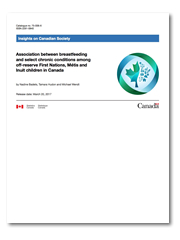
Statistics Canada - Association between breastfeeding and select chronic conditions among off-reserve First Nations, Métis and Inuit children in Canada |
| 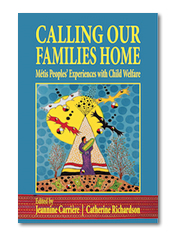
Calling Our Families Home: Métis Peoples' Experiences with Child Welfare, edited by J. Carrière and C. Richardson |
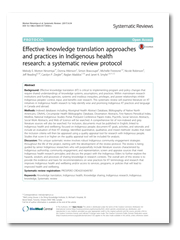
Systematic Reviews - Effective knowledge translation approaches and practices in Indigenous health research: A systematic review protocol by M. Ninomiya et al. |
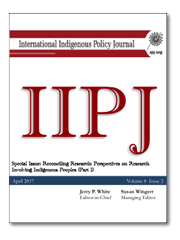
International Indigenous Policy Journal (IIPJ) Vol. 8, Issue 2, 2017 |
| 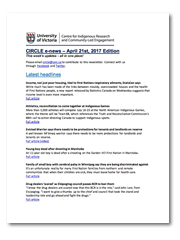
Centre for Indigenous Research and Community-Led Engagement (CIRCLE) Newsletter, April, 2017 |
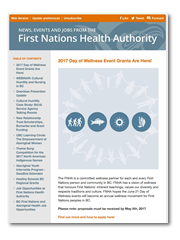
First Nations Health Authority (FNHA) e-Blast Newsletter, April, 2017 |
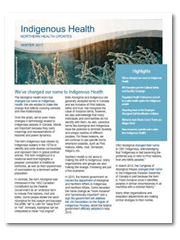
Northern Health: Indigenous Health, Winter 2017 Newsletter |
| 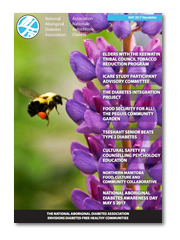
National Aboriginal Diabetes Association (NADA), May 2017 Newsletter |
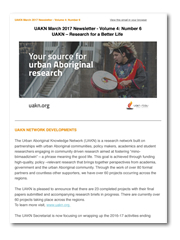
UAKN March 2017 Newsletter |
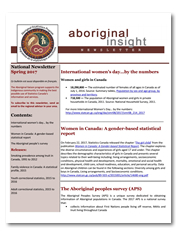
Aboriginal Statistics - Aboriginal Insight, Spring Edition 2017 |
|
|
| Online Multimedia |
| This section features infographics, interactives, apps or videos that we found interesting or educational. Please note the links provided in the NCCAH newsletters are for general interest only and do not indicate an endorsement. The views expressed in the linked resources do not necessarily represent the views of the NCCAH or our funder the Public Health Agency of Canada. Send us an email if you have multimedia resources you would like included in our next newsletter to [email protected] with "Multimedia Submission" in the subject line. |
| 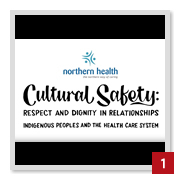
|
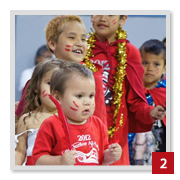
|

|
| 
|
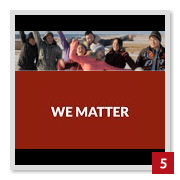
|
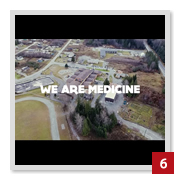
|
| 1) This 5 minute animated video introduces cultural safety and related concepts in an easily understandable way. It invites health care providers to participate in making the health system more culturally safe for Indigenous people and families. The video was produced by the Indigenous Health (formerly Aboriginal Health) team of Northern Health. 2) The video "Gathering Strength, Nurturing Growth - BC Aboriginal Child Care Society (BCACCS)" documents some of the voices of the BCACCS after 20 years of service in research, education and training, resources and advocacy for Indigenous children, caregivers, families, communities and Nations. 3) Global Forum on Health Promotion video "Haida Gwaii Local Food in Schools" focuses on ways to increase healthy, local food consumption while connecting children and youth to food sources and skills. 4) Historica Canada - Heritage Minutes: Kenojuak Ashevak (1927-2013). 5) We Matter Campaign - We Matter is a national campaign about gathering and sharing short video messages of hope for Indigenous youth going through hard times. 6) The N'we Jinan Artists present the music video "We are Medicine" written, recorded and filmed with the Nuxalk students of Acwsalcta School in Bella Coola, British Columbia. |
|
| The NCCs of NCCPH |
| 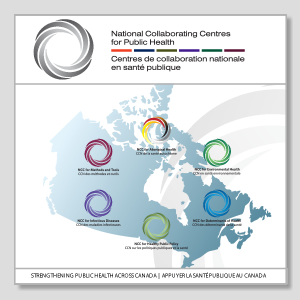
|
The NCCs of NCCPH work together to promote and improve the use of scientific research and other knowledge to strengthen public health practices and policies in Canada. We identify knowledge gaps, foster networks and translate existing knowledge to produce and exchange relevant, accessible, and evidence-informed products with practitioners, policy makers and researchers. Read the latest NCC e-bulletin |
| Population Mental Health Promotion for Children and Youth |
| The six NCCs for Public Health collaborated on a project focused on population mental health promotion for children and youth. Together, they aimed to mobilize public health knowledge and action by clarifying key concepts and exploring the public health role. The project has resulted in a collection of topical papers, alongside general resources, including background information and a resource scan, to help public health practitioners engage with the topic from a variety of perspectives. Read the web story | Download the complete collection |
|
|